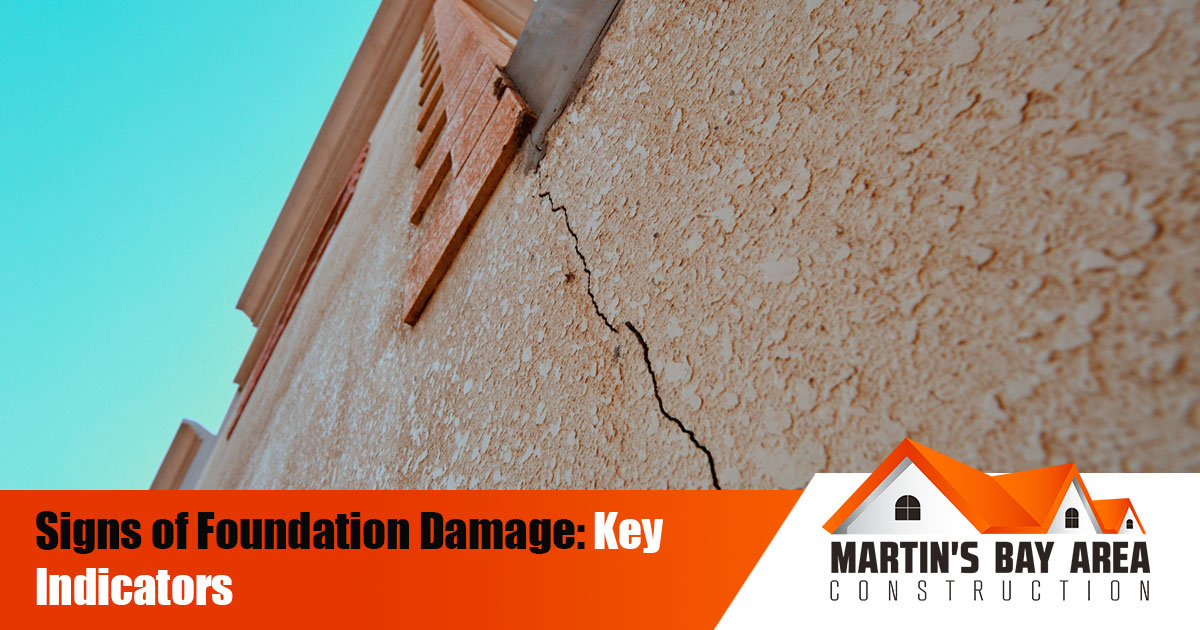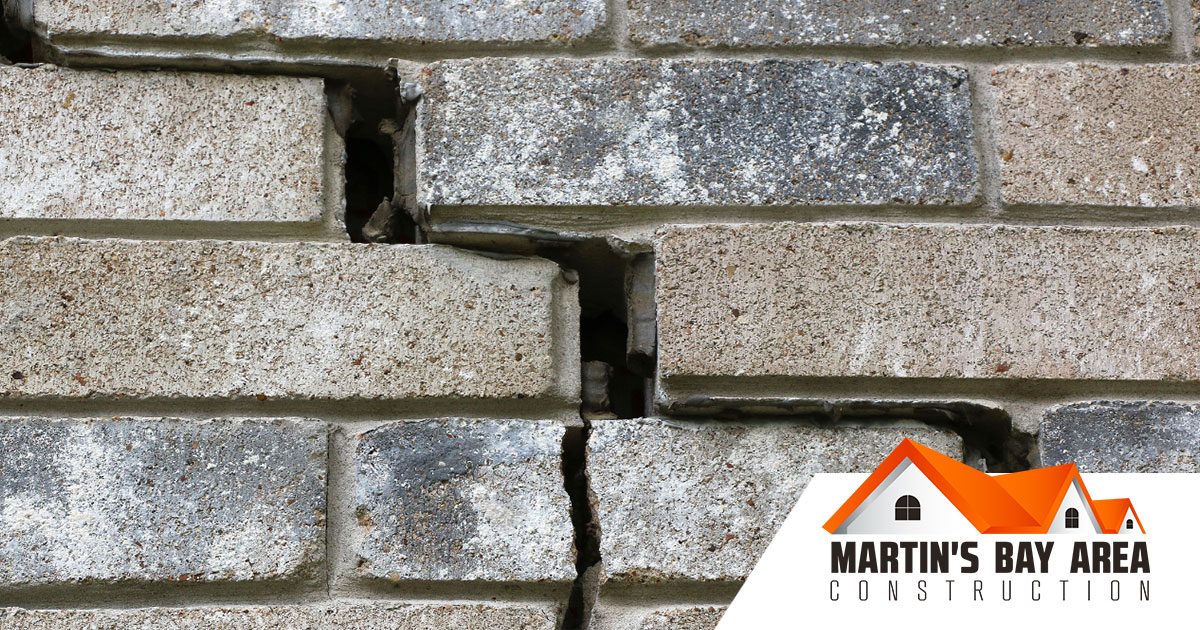
Signs of Foundation Damage: Key Indicators
Do you ever bump your knee on a strange bump in the floor or struggle to open a door that used to glide shut? These could be signs of foundation damage, a sneaky problem that can wreak havoc on your home’s value and stability. Let’s explore some key indicators to help you identify potential foundation issues.
Cracking the Code: Signs Foundation Damage Can’t Hide

Your home’s foundation is its silent guardian, a sturdy base that keeps everything above ground level and secure. However, foundations aren’t invincible. Over time, they can show signs of wear and tear due to various factors, such as poor soil conditions, shifting earth, or even plumbing leaks.
Early detection of foundation damage is crucial to prevent costly repairs and structural problems. So, how do you know if your foundation needs attention? Let’s unveil some key indicators:
Uneven Floors and Creaking Walls:
- Watch your step! Uneven floors that slope or feel bouncy can signal foundation settlement. Additionally, keep an ear out for creaking walls, which might suggest the foundation is shifting slightly. Pay attention to rooms where furniture seems uneven or doors scrape against the floor – these could be early warning signs.
Cracks Telling a Story:
- Cracks happen in homes as they settle, but extensive ones deserve a closer look. Large cracks around windows, doors, or snaking across your foundation walls, especially stair-step cracks, can indicate foundation problems. Diagonal cracks are particularly concerning, as they often indicate foundation movement due to uneven pressure on the soil.
Doors and Windows Acting Up:
- Do your doors and windows suddenly feel stubborn? Sticking doors and windows that were once easy to open and close can indicate foundation issues, causing the house to settle unevenly. This can happen due to shifting soil or foundation movement, making the frames warp slightly.
Water Woes:
- Water is a foundation’s worst enemy. Standing water around your foundation after heavy rain or basement leaks can weaken the soil and stress the foundation. Leaky gutters or improper drainage around the house can be culprits. Additionally, visible moisture in your crawl space can lead to mold growth and foundation problems. Addressing drainage issues and maintaining a dry crawl space is crucial.
The Leaning Tower of Your Home (Not Ideal):
- While a leaning house might seem like something out of a cartoon, it’s a severe sign of foundation damage. Cracks in your chimney or unevenness in your foundation line can indicate a tilting foundation. This can be caused by severe soil erosion or foundation settlement in one area.
Let’s Not Forget the Exterior:
- Don’t just focus on the inside! Cracked brickwork or gaps between your foundation and siding can be signs of foundation movement. Damaged porches or stoops that are sinking or uneven can also point to trouble below the surface. Regularly inspect your home’s exterior for these signs, especially after heavy rains or earthquakes.
It’s Time to Take Action!
Now that you’re armed with this knowledge, you can be more vigilant about spotting signs of foundation damage. Remember, catching foundation problems early can save you money and prevent major headaches in the future. If you notice any of these indicators, don’t hesitate to contact a foundation specialist for a professional inspection.
Cost of Foundation Repair: What to Expect
The cost of foundation repair can vary depending on the severity of the damage, the type of foundation, and the specific repairs required. Addressing minor cracks or leveling uneven floors may be relatively affordable, but extensive repairs involving foundation piers or water damage remediation can be more costly. That’s why it’s essential to catch foundation issues early, as the cost of foundation repair increases with the extent of the damage.
Frequently Asked Questions About Foundation Issues
- How can I prevent foundation damage? Preventing foundation damage starts with regular maintenance and proactive measures. Ensure proper drainage around your home to avoid water pooling near the foundation. Regularly check gutters, downspouts, and your landscape grading to ensure water flows away from your foundation. Also, maintaining a stable moisture level in the soil around your home can help minimize soil shifting that could cause foundation movement.
- Can foundation issues affect my home’s resale value? Yes, foundation problems can negatively impact the resale value of your home. If left unaddressed, buyers may be hesitant to purchase a home with known foundation issues, or they might request a lower price to account for future repairs. On the other hand, resolving foundation problems promptly and having a professional repair report can help maintain or even boost your home’s value.
- How often should I get a foundation inspection? If you notice any signs of trouble, such as cracks, uneven floors, or water damage, it’s advisable to have a professional inspection every few years or sooner. If you live in an area with frequent rain, soil movement, or seismic activity, it may be necessary to inspect your foundation more often.
- Can foundation problems lead to other structural issues? Yes, foundation problems can have a ripple effect on the rest of your home. When the foundation shifts or settles, it can lead to cracks in walls, uneven floors, and misaligned doors and windows. In severe cases, the structural integrity of the house could be compromised, leading to significant repairs if not addressed early.
- What is foundation settlement, and is it always a concern? Foundation settlement refers to the natural sinking of a house’s foundation into the soil over time. Minor settlement is expected in most homes and may not be a cause for concern. However, if the settlement is uneven or extreme, it can lead to cracks, sloping floors, and other signs of foundation damage. Professional evaluation is recommended if you suspect a problematic settlement.
Don’t Let Signs Foundation Damage Shake Your World: Take Action Today!
Have you spotted any of these signs in your home? Don’t wait for the damage to escalate. Taking action now can prevent more extensive and costly repairs in the future. Contact us today to schedule an inspection and ensure your home remains safe and stable. Secure your peace of mind with expert advice and effective solutions tailored to your needs. They can assess the situation and recommend the best solution for your home.
